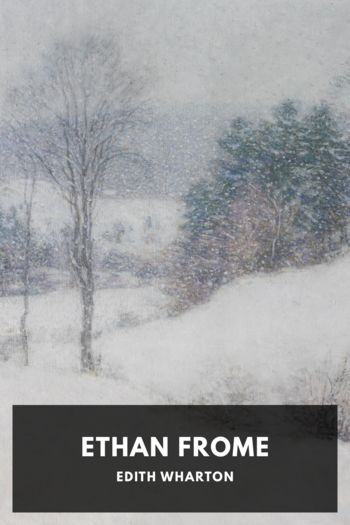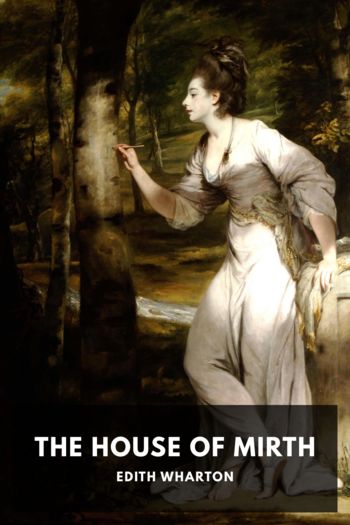Ethan Frome by Edith Wharton (snow like ashes series txt) 📕

- Author: Edith Wharton
Book online «Ethan Frome by Edith Wharton (snow like ashes series txt) 📕». Author Edith Wharton
“Is this where Ned and Ruth kissed each other?” she whispered breathlessly, and flung her arms about him. Her lips, groping for his, swept over his face, and he held her fast in a rapture of surprise.
“Goodbye—goodbye,” she stammered, and kissed him again.
“Oh, Matt, I can’t let you go!” broke from him in the same old cry.
She freed herself from his hold and he heard her sobbing. “Oh, I can’t go either!” she wailed.
“Matt! What’ll we do? What’ll we do?”
They clung to each other’s hands like children, and her body shook with desperate sobs.
Through the stillness they heard the church clock striking five.
“Oh, Ethan, it’s time!” she cried.
He drew her back to him. “Time for what? You don’t suppose I’m going to leave you now?”
“If I missed my train where’d I go?”
“Where are you going if you catch it?”
She stood silent, her hands lying cold and relaxed in his.
“What’s the good of either of us going anywheres without the other one now?” he said.
She remained motionless, as if she had not heard him. Then she snatched her hands from his, threw her arms about his neck, and pressed a sudden drenched cheek against his face. “Ethan! Ethan! I want you to take me down again!”
“Down where?”
“The coast. Right off,” she panted. “So ’t we’ll never come up any more.”
“Matt! What on earth do you mean?”
She put her lips close against his ear to say: “Right into the big elm. You said you could. So ’t we’d never have to leave each other any more.”
“Why, what are you talking of? You’re crazy!”
“I’m not crazy; but I will be if I leave you.”
“Oh, Matt, Matt—” he groaned.
She tightened her fierce hold about his neck. Her face lay close to his face.
“Ethan, where’ll I go if I leave you? I don’t know how to get along alone. You said so yourself just now. Nobody but you was ever good to me. And there’ll be that strange girl in the house … and she’ll sleep in my bed, where I used to lay nights and listen to hear you come up the stairs …”
The words were like fragments torn from his heart. With them came the hated vision of the house he was going back to—of the stairs he would have to go up every night, of the woman who would wait for him there. And the sweetness of Mattie’s avowal, the wild wonder of knowing at last that all that had happened to him had happened to her too, made the other vision more abhorrent, the other life more intolerable to return to …
Her pleadings still came to him between short sobs, but he no longer heard what she was saying. Her hat had slipped back and he was stroking her hair. He wanted to get the feeling of it into his hand, so that it would sleep there like a seed in winter. Once he found her mouth again, and they seemed to be by the pond together in the burning August sun. But his cheek touched hers, and it was cold and full of weeping, and he saw the road to the Flats under the night and heard the whistle of the train up the line.
The spruces swathed them in blackness and silence. They might have been in their coffins underground. He said to himself: “Perhaps it’ll feel like this …” and then again: “After this I shan’t feel anything …”
Suddenly he heard the old sorrel whinny across the road, and thought: “He’s wondering why he doesn’t get his supper …”
“Come,” Mattie whispered, tugging at his hand.
Her sombre violence constrained him: she seemed the embodied instrument of fate. He pulled the sled out, blinking like a night-bird as he passed from the shade of the spruces into the transparent dusk of the open. The slope below them was deserted. All Starkfield was at supper, and not a figure crossed the open space before the church. The sky, swollen with the clouds that announce a thaw, hung as low as before a summer storm. He strained his eyes through the dimness, and they seemed less keen, less capable than usual.
He took his seat on the sled and Mattie instantly placed herself in front of him. Her hat had fallen into the snow and his lips were in her hair. He stretched out his legs, drove his heels into the road to keep the sled from slipping forward, and bent her head back between his hands. Then suddenly he sprang up again.
“Get up,” he ordered her.
It was the tone she always heeded, but she cowered down in her seat, repeating vehemently: “No, no, no!”
“Get up!”
“Why?”
“I want to sit in front.”
“No, no! How can you steer in front?”
“I don’t have to. We’ll follow the track.”
They spoke in smothered whispers, as though the night were listening.
“Get up! Get up!” he urged her; but she kept on repeating: “Why do you want to sit in front?”
“Because I—because I want to feel you holding me,” he stammered, and dragged her to her feet.
The answer seemed to satisfy her, or else she yielded to the power of his voice. He bent down, feeling in the obscurity for the glassy slide worn by preceding coasters, and placed the runners carefully between its edges. She waited while he seated himself with crossed legs in the front of the sled; then she crouched quickly down at his back and clasped her arms about him. Her breath in his neck set him shuddering again, and he almost sprang from his seat. But in a flash he remembered the alternative. She was right: this was better than parting. He leaned back and drew her mouth to his …
Just as they started he heard the sorrel’s whinny again, and the familiar wistful call, and all the confused images it brought with it, went with him down the





Comments (0)